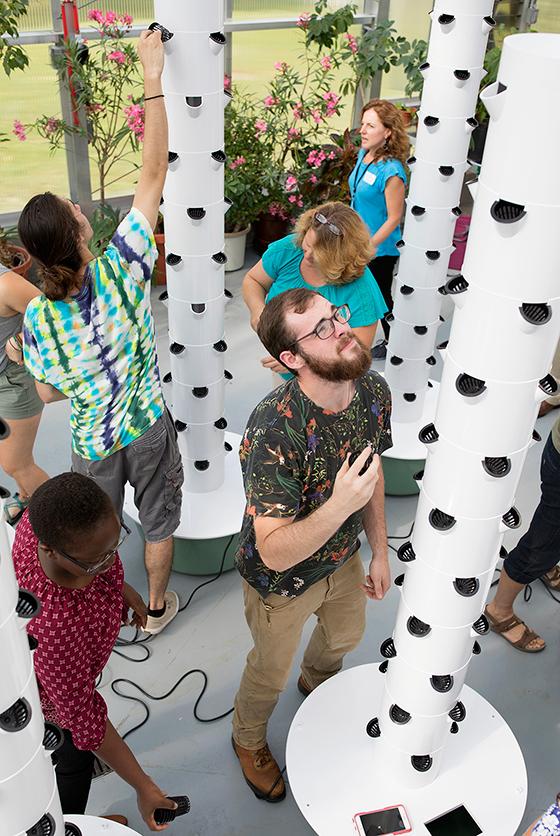
Alexander LaFountain ’19, a junior at SUNY Potsdam, looks up at a newly constructed Tower Garden in SUNY Potsdam's WISER Greenhouse.
The State University of New York at Potsdam was featured as one of the most environmentally responsible colleges in the U.S. and Canada in Princeton Review’s 2017 Guide to Green Colleges.
Princeton Review chose 375 institutions for the seventh edition of its “green guide,” based on data from its survey of hundreds of colleges concerning their commitments to sustainability.
“SUNY Potsdam is surrounded by natural beauty, and our students learn from educational experiences that can only be found in the unique landscape of the North Country and the Adirondacks. It is only natural that the College is committed to fostering a deep understanding of sustainability and environmental protection among our students as well, by leading through example as an institution,” said President Dr. Kristin G. Esterberg.
The Princeton Review chose the colleges in its guide based on “Green Rating” scores (from 60 to 99) that the company tallied over the summer for 629 colleges, using data from its 2016-17 survey of school administrators. The survey asked them to report on their school's sustainability-related policies, practices and programs. More than 25 data points were weighted in the assessment. Information about Princeton Review's Green Rating, is at www.princetonreview.com/green-guide.
As a member of the Association for the Advancement of Sustainability in Higher Education, SUNY Potsdam is dedicated to reducing its impact on the environment, by reducing its energy use, renovating and constructing buildings to LEED specifications, using local food, diverting waste and more.
SUNY Potsdam’s sustainability programs are overseen by Kelly Carter, who also spearheads sustainability efforts for SUNY Canton.
SUNY Potsdam’s sustainability highlights include:
- The College’s Combined Heat and Power Plant reduces SUNY Potsdam’s energy use and shrinks its carbon footprint by generating electricity and producing steam from waste heat, increasing the campus’s efficiency. In addition, the award-winning Performing Arts Center achieved LEED Gold status from the U.S. Green Building Council, and multiple academic buildings and residence halls have recently received environmentally-friendly upgrades, such as water-saving devices, efficient HVAC systems and high-efficiency lighting.
- SUNY Potsdam utilizes Zero Sort recycling, and its campuswide Move Out Program has resulted in the donation of more than 10,000 pounds of reusable goods and materials to various community organizations—diverting needless waste from area landfills.
- SUNY Potsdam has founded the Wagner Institute for Sustainability and Ecological Research, which has teamed up with PACES Dining Services, community groups and local schools to promote sustainable agriculture and green education throughout the educational pipeline.
- The College has encouraged energy conservation through its residence hall energy competition and the Daylight Hour energy reduction initiative.
- Potsdam Auxiliary and College Educational Services (PACES) Dining Services purchases as much as feasibly possible from local vendors, such as Donahue Beef, which provides the campus with locally raised, chemical- and hormone-free, grain-finished Angus beef. PACES purchased more than $482,000 worth of New York State goods in 2016-17. On a local level, PACES purchased more than $38,000 worth of products from local farms, bakeries and specialty goods producers last year.
- Microgreens grown by SUNY Potsdam students and staff in the WISER Greenhouse are utilized in meals in Dexter’s Café and elsewhere on campus—which will only increase with the recent installation of aeroponic Tower Gardens in the WISER Greenhouse and in several dining facilities.
- PACES also composts fruit and vegetable scraps for use by nearby farms, eliminated plastic to-go bags, and has implemented a trayless dining hall system to cut down on food waste and excess water consumption.
SUNY Potsdam offers a major and a minor in environmental studies. The environmental studies program is designed to prepare environmental leaders of the future, with an interdisciplinary curriculum that uses the nearby Adirondack Park as a case study and field site. The environmental studies program seeks to provide students with an understanding of human attitudes and behaviors toward nature, and provides a grounding in science to prepare them to shape viable environmental policy and practice. To learn more, visit http://www.potsdam.edu/academics/interdisciplinary/envstudies.
Beyond environmental studies, numerous majors and programs at SUNY Potsdam incorporate sustainability and conservation into their coursework, from chemistry, biology, geology, environmental science and wilderness education, to the environmental studies First-Year Interest Group and the Adirondack Experience Program.
To find out more about sustainability at SUNY Potsdam, visit https://www.potsdam.edu/about/sustainability.
Founded in 1816, The State University of New York at Potsdam is one of America’s first 50 colleges—and the oldest institution within SUNY. Now in its third century, SUNY Potsdam is distinguished by a legacy of pioneering programs and educational excellence. The College currently enrolls approximately 3,700 undergraduate and graduate students. Home to the world-renowned Crane School of Music, SUNY Potsdam is known for its challenging liberal arts and sciences core, distinction in teacher training and culture of creativity. To learn more, visit www.potsdam.edu.
General News
